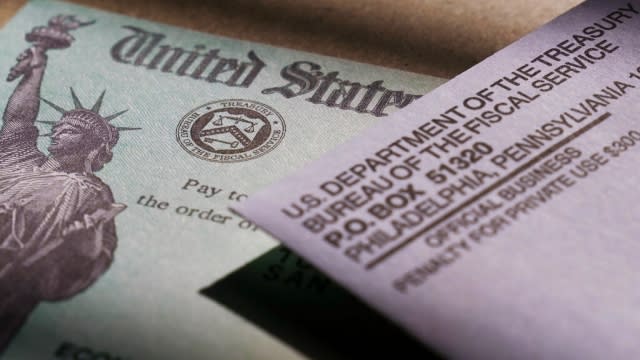Stimulus programs staved off income inequality in 2020, report finds

In 2020, Americans saw multiple stimulus checks, an increase in unemployment payments and other benefits amid the start of the COVID-19 pandemic.
While income inequality reached its highest levels since 1979 in 2020, inequality after credits and taxes was lower than in any year since 2009. That's according to a new report from the Congressional Budget Office.
According to the CBO, households in the bottom 20th percentile saw their average income after government assistance and taxes increase by 15% from 2019 to 2020. Those in the top 20% had their final income increase 7%.
The lowest quintile saw their income after taxes and credits increase despite those in this group earning 4% less before taxes. Those in the top 20% had an over 3% increase in pre-tax wages, with the top 1% raking in an extra 14% of pre-tax income.
Those in the bottom 20% averaged $7,600 in pandemic-related credits in 2020, the CBO said. Nearly half of that income came in the form of unemployment. Those in the middle 20% saw roughly the same amount of pandemic-related federal assistance, bringing in an extra $7,000, with nearly half coming from expanded unemployment.
SEE MORE: Americans living paycheck to paycheck unchanged from a year ago
Even those in the top 1% had an average of $3,000 in pandemic-related assistance.
Pandemic assistance provided households in the bottom 20% about 35% of their income before transfers and taxes, while those in the middle 20% had less than 10% of their income come from these programs.
The CBO noted that while policy changes were responsible for some changes in wealth distribution, the mere fact people were losing their income because of the pandemic would have accounted for some of the changes in income inequality.
"Even without policy changes, transfers and taxes would have lessened some of the increase in inequality because of the effect of budget mechanisms known as automatic stabilizers, which take effect when economic conditions deteriorate," the CBO noted. "As income and employment decreased in 2020 in response to the pandemic, more people became eligible for means-tested transfers and unemployment insurance because their income fell below certain thresholds. Also, more people were pushed into lower tax brackets, which reduced their individual income tax rate."
For months during the pandemic, unemployed workers received an additional $600 unemployment supplement on top of standard unemployment benefits. The U.S. also allowed people who rely on freelance employment to file for unemployment.
The U.S. paid out $872.5 billion in enhanced unemployment payments.
There were also two rounds of stimulus checks many Americans received in 2020 — one worth up to $1,200 and a second check worth up to $600. A third round of checks was sent out in early 2021.
